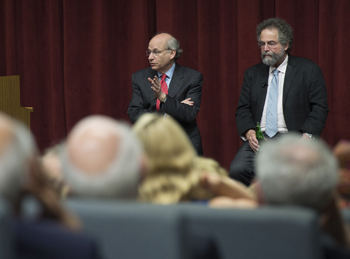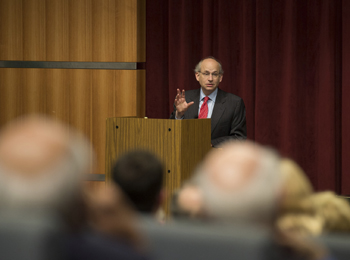A little over 30 years ago, Lawrence Sager, then a professor at New York University’s School of Law, recruited a young legal scholar named David Leebron to become a faculty member at the school. Now president of Rice University, Leebron teamed up with his former mentor and colleague to discuss the legal underpinnings of timely questions of religious freedom and equality in the United States during a March 31 forum hosted by Rice’s Boniuk Institute for the Study and Advancement of Religious Tolerance.

Rice President David Leebron and University of Texas at Austin law professor Lawrence Sager spoke at Herring Hall March 31 about questions of religious freedom and equality. Photos by Jeff Fitlow
More than 150 people attended the forum in Herring Hall. Titled “The Supreme Court Gets Religion: Recent Head-Turning Cases,” the event was co-sponsored by Rice University Lawyer Alumni and the law firm Locke Lord LLP.
“Tonight’s event hinges on a clause within the First Amendment to the U.S. Constitution that states, ‘Congress shall make no law respecting an establishment of religion, or prohibiting the free exercise thereof,'” said Donald Morrison, co-director of the Boniuk Institute and professor of philosophy and classical studies, in introducing the forum. “This phrase, though brief, has provided much fodder to the legal community.”
As the evening’s discussion made evident, the Supreme Court is still working through the meaning and implications of the clause.That clause is very familiar to Leebron and Sager, until recently the dean of the law school and now the Alice Jane Drysdale Sheffield Regents Chair at the University of Texas at Austin; they are co-teaching the Legal Framework of Religious Tolerance, a Boniuk Institute-sponsored course, for the second year in a row.
In his introductory remarks, Leebron acknowledged the current controversy over Indiana’s Religious Freedom Restoration Act. “My day actually started with a call from the (Indianapolis-based) NCAA asking me what I thought we should be doing,” said Leebron, a member of the NCAA Division I board of directors. “We have a whole set of issues laying out how to think about religious freedom, religious tolerance, accommodation of religion and what that means for discrimination and private behavior.”
Sager, one of the country’s preeminent constitutional scholars and the co-author of “Religious Freedom and the Constitution,” highlighted the Supreme Court’s 2014 Burwell versus Hobby Lobby ruling, a landmark decision allowing closely held for-profit corporations to be exempt from a law its owners religiously object to if there is a less restrictive means of furthering the law’s interest. The decision was an interpretation of the federal Religious Freedom Restoration Act, as applied to the Affordable Care Act, and does not address whether such corporations are protected by the free exercise of religion clause of the Constitution’s First Amendment.
“The center question … is in some ways the deepest question in religious toleration as an American Constitution,” Sager said.”The question is this: Do religiously motivated people, by virtue of their religious commitments and projects, have a special right to disobey the laws that everyone else has to obey? Call that the issue of religious autonomy.”

Leebron said the Supreme Court’s 2014 ruling on a case involving opening prayers at a New York town’s council meetings represents a troublesome tipping point for religion not merely in the public square, but the political squares.
Sager cited an 1878 Supreme Court ruling, Reynolds versus United States, which held that religious duty was not a defense to a criminal indictment – bigamy, in this instance – in arguing against granting such autonomy. “That decision … was emphatically right,” he said. “Giving religiously motivated persons a special privilege to disobey laws runs into two insurmountable problems: The first is the problem of unfairness. … It’s simply unjust and, indeed, ought to be unconstitutional under the ideas of religious liberty, to distinguish between the religiously motivated and the nonreligiously motivated. The second reason is in some ways more difficult, which is, How do you define religion? What qualifies as religion?”
Leebron, who was dean of Columbia Law School before coming to Rice, gave an overview of the Supreme Court’s 2014 ruling on Greece versus Galloway, in which the court decided that the town of Greece, N.Y., may have volunteer chaplains open each town council meeting with a prayer and does not violate the Establishment Clause of the First Amendment even if the prayers are quite sectarian. He began his remarks with a prayer offered at one of the meetings.
“Everybody on the Supreme Court agreed the Constitution allowed the kind of prayers we hear used to open Congressional and other legislative sessions,” said Leebron, a graduate of Harvard College and Harvard Law School, where he was elected president of the Law Review and worked with future Chief Justice of the United States John Roberts. “The question for the Supreme Court was, in some sense, whether that was a particular historic practice that persisted or part of a much broader view of the Constitution that should frame our analysis in a case like the town of Greece. In the end, the (Supreme Court) majority said that if history permitted this practice, legislative prayers, that’s the broader direction we must go.”
Leebron said the ruling represents a troublesome tipping point for religion not merely in the public square, but the political squares. “It takes what is a historic exception – that is, legislative prayer or ‘In God We Trust’ on our money — and expands it in a very broad position, a kind of ethos of combining religion and governmental or state activity,” he said.
The Boniuk Institute was founded in 2013 with a gift from Houston philanthropists Dr. Milton and Laurie Boniuk. It is an expansion of the Boniuk Center that was created at Rice in 2004. The Boniuk Center was dedicated to fostering tolerance among people of all and no faiths, and to studying the conditions in which tolerance and intolerance flourish. The Boniuk Institute’s expanded mission focuses on research, education and community engagement.


Leave a Reply